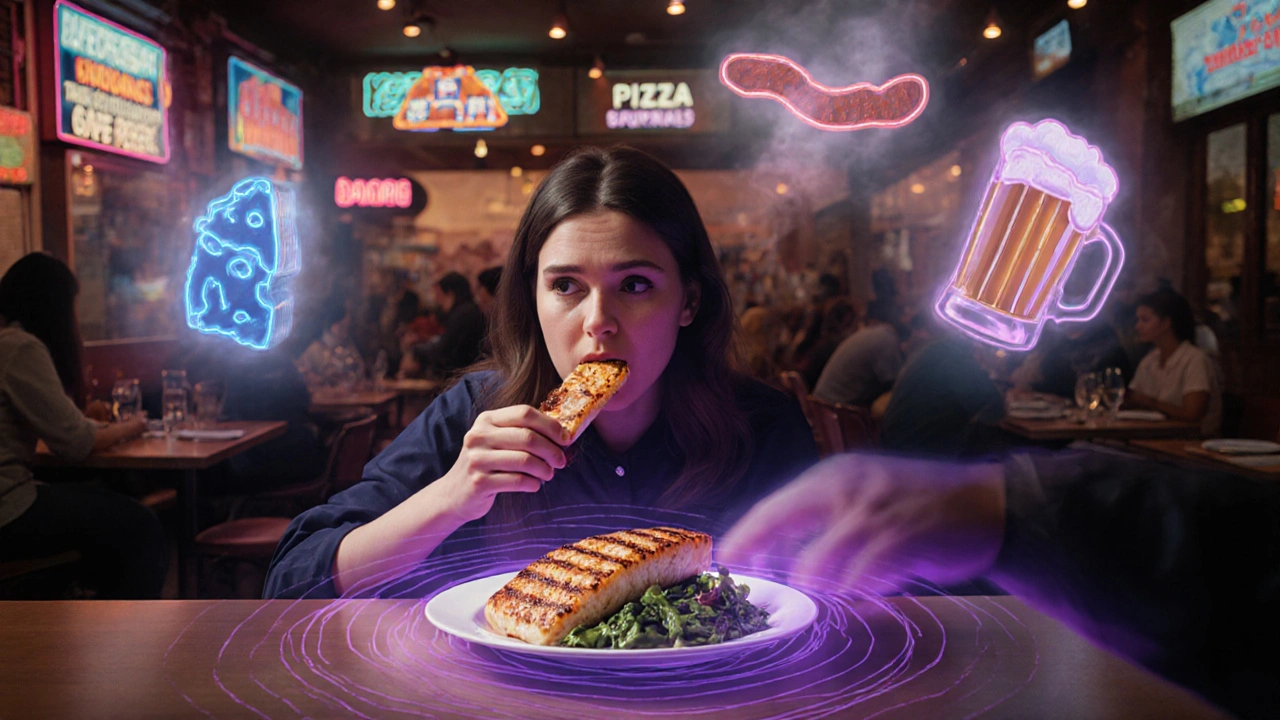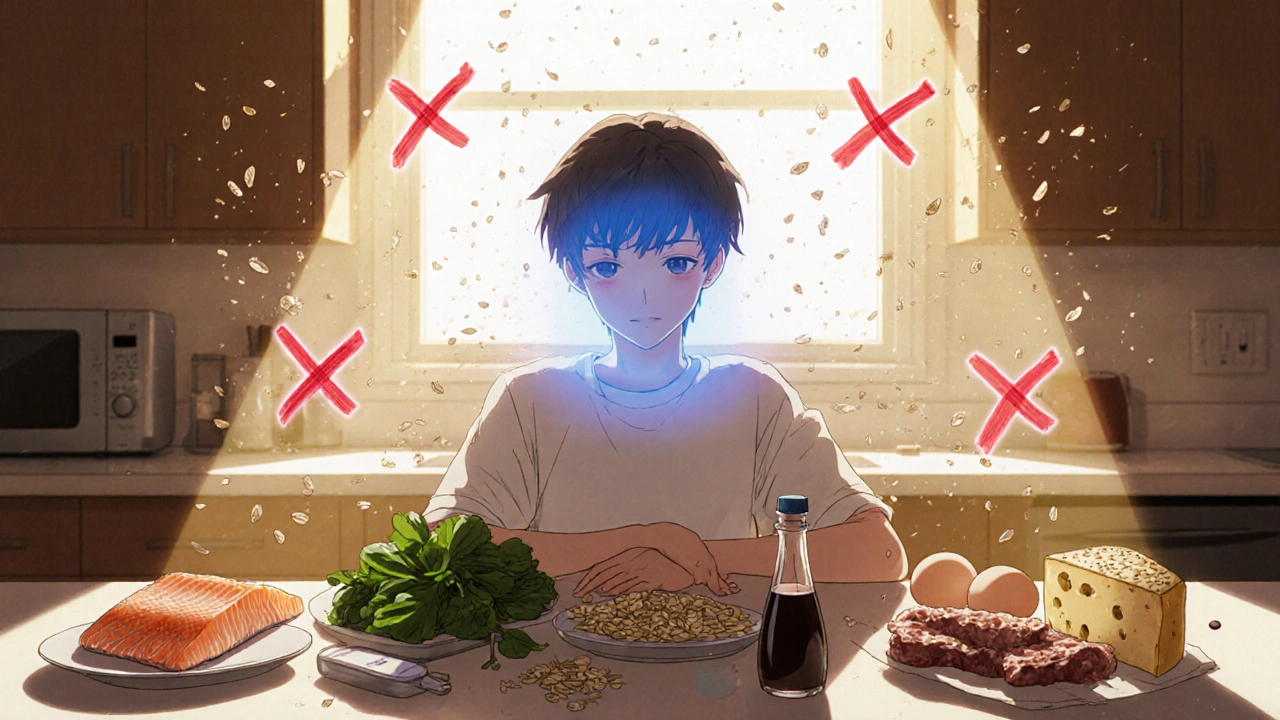When you're taking venlafaxine for depression or anxiety, what you eat matters more than you might think. This medication works by balancing brain chemicals like serotonin and norepinephrine, but certain foods can interfere with how it works-or even cause dangerous side effects. You don’t need to go on a strict diet, but knowing what to avoid and what to include can make a real difference in how you feel day to day.
Why Food Matters with Venlafaxine
Venlafaxine is an SNRI-serotonin-norepinephrine reuptake inhibitor. It helps your brain hold onto more of these mood-regulating chemicals. But when you combine it with high levels of tyramine, a compound found in aged or fermented foods, you risk a sudden spike in blood pressure. This isn’t just a mild discomfort. It’s called a hypertensive crisis, and it can lead to headaches, chest pain, rapid heartbeat, or even stroke.
This risk is higher with older antidepressants like MAOIs, but venlafaxine at higher doses (over 300 mg daily) can act similarly. The FDA warns that even though the risk is low at standard doses, it’s still real. And if you’re on other medications, have high blood pressure, or are older, your chances go up. So it’s not about fear-it’s about smart choices.
Foods to Avoid While on Venlafaxine
Here’s what to skip or limit:
- Aged cheeses-like cheddar, blue cheese, parmesan, Swiss, and gouda. Fresh cheeses like cottage cheese, ricotta, and mozzarella are fine.
- Cured or fermented meats-think salami, pepperoni, summer sausage, and pickled herring. Even jerky can be risky.
- Fermented soy products-soy sauce, miso, tempeh, and fermented tofu. Regular tofu and edamame are okay.
- Tap beer and draft beer-they contain higher tyramine than bottled or canned beer. Wine and hard liquor are lower risk, but still limit intake.
- Overripe fruits-bananas, avocados, and figs that are very soft or brown around the edges. Fresh, firm ones are safe.
- Yeast extracts-like Marmite or Vegemite. These are packed with tyramine.
- Leftovers stored over 48 hours-tyramine builds up as food ages, even if refrigerated.
Some people think they can get away with small amounts. But if you’ve ever had a sudden, pounding headache after eating blue cheese or a sandwich with pepperoni, that might’ve been your body reacting. Don’t test it. Stick to fresh, unaged, and unfermented options.
What You Should Eat Instead
Good nutrition doesn’t just avoid danger-it supports healing. Your brain needs steady fuel to respond to venlafaxine properly. Focus on these nutrients:
- Omega-3 fatty acids-found in fatty fish like salmon, sardines, and mackerel. A 2023 meta-analysis in Translational Psychiatry showed people with depression who took omega-3s alongside antidepressants improved faster than those who didn’t.
- B vitamins-especially B6, B9 (folate), and B12. These help your body make serotonin and dopamine. Leafy greens, lentils, eggs, and fortified cereals are great sources. Low B12 levels are linked to worse depression outcomes.
- Magnesium-helps calm the nervous system. Nuts, seeds, spinach, black beans, and whole grains are rich in it. A 2022 study in Journal of Affective Disorders found magnesium supplements improved mood in people on antidepressants.
- Probiotics-gut health affects brain health. Yogurt with live cultures, kefir, sauerkraut (in moderation), and kimchi (if you’re not sensitive to tyramine) support a healthy microbiome.
- Complex carbohydrates-oats, sweet potatoes, quinoa, and brown rice help stabilize blood sugar. Crashes in blood sugar can trigger anxiety and irritability.
One woman on venlafaxine told her doctor she felt worse after switching to a low-fat diet. She cut out eggs and nuts and started eating mostly rice and pasta. Her energy dropped, her anxiety spiked. When she added back healthy fats and protein, her mood improved within two weeks. Nutrition isn’t a side note-it’s part of the treatment.

Alcohol, Caffeine, and Supplements
Alcohol doesn’t just interact with venlafaxine-it makes depression worse. It’s a depressant. Even one drink can increase drowsiness, dizziness, and emotional numbness. If you drink, keep it to one serving occasionally, and never on an empty stomach.
Caffeine is trickier. It can help with fatigue, which is common with depression. But too much-especially from energy drinks or multiple cups of coffee-can cause jitteriness, insomnia, and heart palpitations. If you’re sensitive, switch to green tea or decaf. Keep daily caffeine under 200 mg (about one 12-oz coffee).
Supplements can be dangerous. St. John’s wort, tryptophan, and 5-HTP all raise serotonin. Taking them with venlafaxine can cause serotonin syndrome-a rare but life-threatening condition with symptoms like high fever, confusion, rapid heartbeat, and muscle rigidity. Never mix them without talking to your doctor.
Timing and Meal Planning
Take venlafaxine at the same time every day, with or without food. But don’t skip meals. Low blood sugar can mimic anxiety symptoms-shakiness, sweating, racing thoughts. That might make you think your medication isn’t working when it’s just your body needing fuel.
Plan simple meals ahead. Keep hard-boiled eggs, sliced turkey, hummus with veggies, oatmeal, and fruit on hand. Avoid shopping when hungry-it’s easy to grab aged cheese or processed snacks. Cook in batches. A stir-fry with fresh tofu, broccoli, and brown rice lasts three days and is safe.
If you eat out, ask how food is prepared. Skip anything labeled “aged,” “fermented,” or “cured.” Choose grilled chicken or fish with steamed vegetables. Most restaurants will accommodate if you ask.

What If You Accidentally Eat Something Risky?
If you eat aged cheese or cured meat and feel a sudden headache, chest tightness, or rapid heartbeat, sit down and call your doctor. Don’t wait. Check your blood pressure if you have a home monitor. These symptoms usually pass within a few hours, but it’s better to be safe.
Keep a food and mood journal for two weeks. Write down what you ate and how you felt. You might notice patterns-like feeling anxious after a late-night sandwich with pepperoni. That’s not coincidence. It’s data.
When to Talk to Your Doctor
Not everyone needs to avoid the same foods. If you’re on a low dose of venlafaxine (under 150 mg), your risk is minimal. But if you’ve had high blood pressure before, are over 65, or take other meds like decongestants or stimulants, be extra careful.
Always tell your doctor about any supplements, herbal teas, or over-the-counter meds you take. Even cold remedies can contain ingredients that interact with venlafaxine.
If your mood doesn’t improve after 6-8 weeks, or if side effects like nausea, insomnia, or dizziness get worse, don’t assume it’s your diet. Talk to your provider. You might need a dosage change or a different medication.
Final Thoughts
Venlafaxine can help you feel like yourself again. But food isn’t just fuel-it’s medicine too. Avoiding high-tyramine foods isn’t about restriction. It’s about giving your brain the best chance to heal. Eat fresh, eat whole, eat regularly. Support your nervous system with omega-3s, B vitamins, and magnesium. Skip the processed stuff. Limit alcohol and caffeine. And if you’re unsure, ask your pharmacist or dietitian. They can help you build a plan that fits your life.
This isn’t about perfection. It’s about awareness. One meal won’t ruin your progress. But consistent choices? They can change everything.
Can I eat cheese while taking venlafaxine?
You can eat fresh cheeses like mozzarella, ricotta, cottage cheese, and cream cheese. Avoid aged cheeses such as cheddar, blue cheese, parmesan, and Swiss. These contain high levels of tyramine, which can raise blood pressure when combined with venlafaxine, especially at higher doses.
Does venlafaxine cause weight gain?
Unlike some antidepressants, venlafaxine is less likely to cause weight gain. In fact, some people lose a small amount of weight early on due to reduced appetite. But long-term, weight changes vary by person. Eating balanced meals and staying active helps maintain a healthy weight.
Can I drink coffee while on venlafaxine?
Moderate caffeine is usually fine-up to 200 mg per day (about one 12-oz coffee). But if you feel jittery, anxious, or have trouble sleeping, cut back. Caffeine can worsen side effects like restlessness and insomnia, which are already possible with venlafaxine.
Is it safe to take omega-3 supplements with venlafaxine?
Yes, omega-3 supplements are generally safe and may even improve how well venlafaxine works. Studies show they support brain function and reduce inflammation linked to depression. Choose a high-quality fish oil with at least 1,000 mg of EPA and DHA combined. Always check with your doctor before starting any supplement.
How long does it take for venlafaxine to work with diet changes?
Venlafaxine typically takes 4-6 weeks to show full effects. Diet changes don’t speed up the medication’s action, but they support your brain’s ability to respond. Many people notice better energy, fewer anxiety spikes, and improved sleep within 2-3 weeks of eating more nutrient-rich foods and avoiding triggers.
Should I avoid all fermented foods?
Not all. Avoid fermented soy (miso, soy sauce) and aged products. But plain yogurt with live cultures and small amounts of sauerkraut or kimchi are usually fine if you’re on a low dose of venlafaxine and don’t have high blood pressure. Always start with small portions and monitor how you feel.
Can I take vitamin D with venlafaxine?
Yes, vitamin D is safe and often recommended. Low vitamin D levels are common in people with depression, and correcting them can improve mood. Most people need 1,000-2,000 IU daily. Check your levels with a blood test first, and follow your doctor’s advice on dosage.
If you're unsure about any food, drink, or supplement, talk to your doctor or a registered dietitian who understands psychiatric medications. You don’t have to figure this out alone.
